|
|
|
Sort Order |
|
|
|
Items / Page
|
|
|
|
|
|
|
| Srl | Item |
| 1 |
ID:
117398
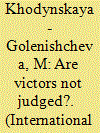

|
|
|
|
|
| Publication |
2012.
|
| Summary/Abstract |
THE ARAB SPRING which is still raging in the Middle East gives us all second thoughts about the methods of crisis settlement in any corner of the world. The Libyan crisis and the NATO operation codenamed Unified Protector suggests two questions: How far can the international community or its members go in their assistance to the state in crisis? What could and should be done to keep this aid within international law and to prevent it from developing into shameless abetting of the forces seeking regime change rather than democratic changes? In Libya, NATO demonstrated that foreign interference can become a "continuation of political intercourse." Certain states are trying to pass a "short victorious war" for a legitimate instrument the international community can employ to help peoples "fight for democracy" irrespective of the state, its role in regional stability, specifics of its political system and ethnoconfessional makeup and the people's readiness to greet changes. In fact, this tactics is employed for the sake of prompt economic and political dividends which painstaking and consistent efforts to develop political systems, economic and social spheres of these states cannot bring.
|
|
|
|
|
|
|
|
|
|
|
|
|
|
|
|
| 2 |
ID:
117384
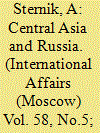

|
|
|
|
|
| Publication |
2012.
|
| Summary/Abstract |
THIS YEAR marks 20 years of diplomatic relations between the Russian Federation and the CIS, including Central Asia. We know that our relations have existed for thousands of years, but the past two decades have been an important phase in the latest round of geopolitical development.
|
|
|
|
|
|
|
|
|
|
|
|
|
|
|
|
| 3 |
ID:
117385
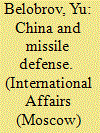

|
|
|
|
|
| Publication |
2012.
|
| Summary/Abstract |
THE UNITED STATES' GLOBAL missile defense system is a far more serious problem for the national security of the People's Republic of China than for Russia, as China's nuclear missile capability is much weaker than Russia's and has lower survivability. Indeed, given that the US and its allies are not particularly secretive about their intentions to form a united front against China, which they claim is challenging the whole Western world - China can't help but cast a wary eye on the plans of bringing US military structures close to its borders.
|
|
|
|
|
|
|
|
|
|
|
|
|
|
|
|
| 4 |
ID:
117387


|
|
|
|
|
| Publication |
2012.
|
| Summary/Abstract |
V.V. PUTIN'S PROGRAMMATIC ARTICLE concerning the idea of a new regional association in the Eurasian space - a Eurasian Union1 - has provided a new impulse to integration processes in the post-Soviet area, not only ideological but also organizational. At present, the Eurasian Union project includes three states - Russia, Belarus, and Kazakhstan, but it is an open project, envisioning further expansion in Eurasia.
|
|
|
|
|
|
|
|
|
|
|
|
|
|
|
|
| 5 |
ID:
117390


|
|
|
|
|
| Publication |
2012.
|
| Summary/Abstract |
SO FAR THE GERMANS have known about the crisis in the eurozone mainly from newspaper headlines and popular TV programs. In Germany itself, all is still relatively quiet. According to the latest opinion polls, almost 60% of German citizens are convinced that in the coming year their living standards will improve and they will keep their jobs.
True, the German economy is slowing but, according to forecasts, it will continue to grow in the current year as well. Unemployment is at a 20-year low (5.6% of the working-age population in May 2012). Over the past year, wages have slightly increased (+1.1%), as well as labor productivity (+1.6%). The budget deficit has been reduced to an acceptable level: 1% of GDP. Under the medium-term fiscal plan adopted in June 2012, the German government expects to balance the Federal budget by 2016.
|
|
|
|
|
|
|
|
|
|
|
|
|
|
|
|
| 6 |
ID:
117383
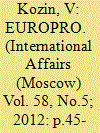

|
|
|
|
|
| Publication |
2012.
|
| Summary/Abstract |
PRESIDENTS Vladimir Putin and Barack Obama in their joint statement signed on June 18, 2012 at Los Cabos, Mexico, in the margins of the summit of the G20 acknowledged differences in assessments of the missile defense issue in Russian-American relations. For several years, it was a persistent stumbling block to the politico-military agenda of the two mightiest nuclear powers. Still, both parties agreed to "continue a joint search for solutions to challenges in the field of missile defense.
|
|
|
|
|
|
|
|
|
|
|
|
|
|
|
|
| 7 |
ID:
117380


|
|
|
|
|
| Publication |
2012.
|
| Summary/Abstract |
OUR COUNTRY'S PROMINENT ROLE in dealing with many global issues and regional conflicts, a permanent seat on the UN Security Council, participation in the G8 and G20 - this is a far from complete list of criteria that reflect the geopolitical status of Russia. The completion of a multi-year negotiation process on the terms of Russian participation in the World Trade Organization (WTO) lends credence to our consistent policy to integrate the country into the global economy and strengthens the international position of Russia as one of the key participants in the process of reforming the global economic architecture.
|
|
|
|
|
|
|
|
|
|
|
|
|
|
|
|
| 8 |
ID:
117396
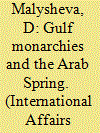

|
|
|
|
|
| Publication |
2012.
|
| Summary/Abstract |
THE HIGH WAVE of social and political protest in the Middle East and North Africa raised by mainly domestic discontent gave all sorts of external forces a chance to channel anti-government riots in the desired direction. The Gulf monarchies or, to be more exact, the "Wahhabi tandem"1 of Saudi Arabia and Qatar moved, for the first time in their history, onto the world arena; they joined forces with the West and tapped to the full their financial, military, political and information resources to make the Persian Gulf a geopolitical center in its own right in the Middle East and the Arab world.
|
|
|
|
|
|
|
|
|
|
|
|
|
|
|
|
| 9 |
ID:
117401
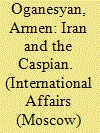

|
|
|
|
|
| Publication |
2012.
|
| Summary/Abstract |
FOR MANY REASONS, the wars are no longer what they were in the times of Carl von Clausewitz; the so-called total war, its concept and its practice, has become obsolete. In the past, the warring sides aimed at the total destruction of the enemy's manpower along the fronts and the manpower reserves in the rear; not infrequently, civilian population was also destroyed as a deterrent. Hitler was an adept in total war in its absolute form.
|
|
|
|
|
|
|
|
|
|
|
|
|
|
|
|
| 10 |
ID:
117400


|
|
|
|
|
| Publication |
2012.
|
| Summary/Abstract |
International Affairs: Mr. Ambassador, this year's round of negotiations over Iran's nuclear program in Moscow on June 17-19 seems to have had a lot of meaning. The approach of Russia, which champions a politico-diplomatic solution to the problem, and its interest in seeing concrete results from the meeting - a continuous dialogue, and step-by-step progress - had been reiterated during the visit of Foreign Minister Sergei Lavrov to Tehran ahead of the talks. The visit not only confirmed Moscow's readiness to promote dialogue on the issue, but also provided yet another signal to the participants of the negotiation process that, as before, Russia would not support sanctions against Iran. How do you, Mr. Ambassador, assess Russia's role in preparing and conducting one more round of negotiations and the results of the Moscow meeting between the group of six mediators and Iran?
|
|
|
|
|
|
|
|
|
|
|
|
|
|
|
|
| 11 |
ID:
117394
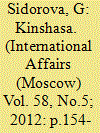

|
|
|
|
|
| Publication |
2012.
|
| Summary/Abstract |
THE OUTLINE of the DRC's contemporary foreign policy began to take shape with the end of the civil war (1998-2003) in the midst of a political and military crisis. To rehabilitate the national image and regain credibility on the international scene was not easy. The country had a large external debt (approximately $14 billion), lost its voting rights in the African Union (because of unpaid membership dues), and was poorly represented and passive in international organizations. During the transition period (2003-2005), the leadership's efforts were mainly to restore the devastated economy and lay the foundations of a democratic state. But instability on the eastern borders of the DRC, where disparate forces still fought each other, hampered those efforts.
|
|
|
|
|
|
|
|
|
|
|
|
|
|
|
|
| 12 |
ID:
117397
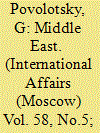

|
|
|
|
|
| Publication |
2012.
|
| Summary/Abstract |
THE EVENTS, known as the Arab Spring, which in 2011 shattered some of the Arab states of the Greater Middle East, have triggered military-political and military-strategic developments worldwide. Their whole gamut can hardly be grasped: what happened in individual countries and the region as a whole unfolded in different temporal scales and was planned and realized on different scenes: geopolitical, regional and local. To predict future developments in the Greater Middle East, one should look deep into what has already happened and what is going on in the region. The analytical report "The Middle East: Possible Variants of Transformation Processes"* (issued by the Center for Middle Eastern Studies at the Institute for Contemporary International Studies (Moscow State Institute (University) of International Relations, Ministry of Foreign Affairs of the Russian Federation) can be described as one of the best and carefully substantiated attempts to look into the region's future and assess the results of the recent developments.
|
|
|
|
|
|
|
|
|
|
|
|
|
|
|
|
| 13 |
ID:
117388


|
|
|
|
|
| Publication |
2012.
|
| Summary/Abstract |
THIS PAST AUGUST, or to be more accurate, the night of August 7-8, was the fourth anniversary of the tragic events in South Ossetia. It should be recalled that on that night, treacherously breaking his ceasefire pledge made the day before on public television, Georgian President M. Saakashvili issued an order to start a night attack on the peaceful city of Tskhinval, the capital of South Ossetia. After massive rocket and artillery bombardment the city came under attack by Georgian ground forces supported by tanks and aviation. The results of the criminal act were deplorable: Hundreds killed and thousands injured; dozens of homes and other buildings razed to the ground, and almost complete destruction of South Ossetia's socio-economic infrastructure.
|
|
|
|
|
|
|
|
|
|
|
|
|
|
|
|
| 14 |
ID:
117399
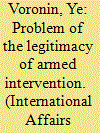

|
|
|
|
|
| Publication |
2012.
|
| Summary/Abstract |
THE ATLANTIC ALLIANCE'S military intervention in Libya, like similar actions by Western community nations (in Yugoslavia, Iraq, Kosovo), which have questioned the principles and rules of modern international law, above all the principle of state sovereignty, does not appear to have received proper, qualified legal evaluation as yet.
Apart from being out of tune with the mandate under United Nations Security Council resolution 1973, the anti-Libyan military action by NATO countries was also not in keeping with Article 42 of the UN Charter, on which rests the contemporary application of the doctrine about coercive measures involving the use of armed force. The decision on the use of force was sanctioned by the Security Council, but the character of its "unlimited" use was fixed by a group of leading Western powers, with participation from NATO's military structures. Modern practice provides for the Security Council to delegate limited powers to use military force.1 In the case of Libya, the provision of a mandate allowing limited use of force in the form of establishing a no-fly zone over Libyan territory to prevent the Qaddafi regime's use of deadly force against its own people was not accompanied by any UN participation in the form of auxiliary functions of peacekeeping nature (surveillance, monitoring) - as it was for example in the peace settlement under the Dayton Accords, or with the "parallel strategy" in Bosnia and Herzegovina.
|
|
|
|
|
|
|
|
|
|
|
|
|
|
|
|
| 15 |
ID:
117395


|
|
|
|
|
| Publication |
2012.
|
| Summary/Abstract |
"PUBLIC PASSION of Pussy Riot" has subsided. The verdict has been passed. Foreign Minister of Russia Lavrov told the journalists in Finland: "Let's not coming to snap judgments and getting into a tantrum." The Russian Orthodox Church's High Council said in a statement: "We appeal to the public authorities to show mercy, within the law, on the convicted." Timing was perfect: despite the pressure from the laity the top Church figures preferred to keep their opinions to themselves until the verdict had been passed. The Orthodox Christians, nevertheless, are adamant: leniency might provoke others to similar acts in other churches.
|
|
|
|
|
|
|
|
|
|
|
|
|
|
|
|
| 16 |
ID:
117389
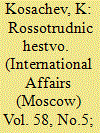

|
|
|
|
|
| Publication |
2012.
|
| Summary/Abstract |
THE FEDERAL AGENCY for the Commonwealth of Independent States, Compatriots Living Abroad and International Humanitarian Cooperation, or Rossotrudnichestvo, subordinate to the Foreign Ministry, is the youngest in the system of state executive bodies of the Russian Federation. In September, it will be four years old. Much has been done in so short a time: a regulatory framework for the agency created; the main thrust areas and, you may say, the work philosophy defined; a number of interesting projects launched on this basis; and an extensive amount of work performed to restore and expand the network of foreign representations.
|
|
|
|
|
|
|
|
|
|
|
|
|
|
|
|
| 17 |
ID:
117381


|
|
|
|
|
| Publication |
2012.
|
| Summary/Abstract |
EARLY IN JUNE 2012, President of the Russian Federation Vladimir Putin arrived to the People's Republic of China with a state visit; it was at the same time that the SCO Heads of Governments Council met in Beijing.
The Moscow press reacted with "Disagreements between the RF and China Resurfaced at the Summit," "The Shanghai Organization Is Torn Apart by Organizers," "The Shanghai Organization of Competition," "The Beijing Summit: An Arena of Latent Moscow-Beijing Rivalry" and much more in the same vein. It was stressed that the Beijing SCO Summit had failed "to agree on the SCO long-term plans and sign the SCO Development Strategy" and had "merely" agreed to sign "The Strategic Plan for the Medium-Term Development of the Shanghai Cooperation Organization"; 20-odd documents signed by Moscow and Beijing during President Putin's state visit were pushed aside and forgotten.
|
|
|
|
|
|
|
|
|
|
|
|
|
|
|
|
| 18 |
ID:
117392


|
|
|
|
|
| Publication |
2012.
|
| Summary/Abstract |
GLOBALIZATION BRINGS FORTH new mechanisms to regulate foreign policy and international relations while placing special demands upon security and innovative mechanisms of interaction between states. The emergence of new actors on the world political arena has urged the states to update their national programs for establishing mutually beneficial cooperation with newly formed institutions.
One example of such cooperation is cooperation between Russia and the European Union confirmed by comprehensive basic agreements, the development of the Partnership for Modernization program, and cooperation along the migration track. The latter is only becoming a strategic objective but one can already talk about likely successful steps in this area. The agenda of today's dimension of Russo-European relations calls for the possibility of establishing a visa-free travel across Russia and the European Union. This is a vital question and an interesting subject for exchanging views not only among experts and scholars but also among business leaders and ordinary people who want to travel across the territory of the European Union without visa barriers. This article will attempt to trace back the phases of the forming the prerequisites for a visa-free regime, examine two diametrically opposed views on this initiative and consider possible ways for realizing the idea of a visa-free dialogue, which was for the first time made public by Vladimir Putin in 2002.
|
|
|
|
|
|
|
|
|
|
|
|
|
|
|
|
| 19 |
ID:
117379
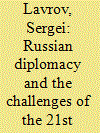

|
|
|
|
|
| Publication |
2012.
|
| Summary/Abstract |
S. Lavrov: There are a few basic parameters for evaluation of the current international situation that are generally accepted by all who are trying to seriously comprehend the world tendencies. First, we are currently experiencing a period of transition, which essentially could mean another era change. President Vladimir Putin gave special emphasis to this thesis in his speech at the Russian ambassadors and permanent representatives meeting in July. Profound changes are underway in the international landscape, attended by disturbances in the economy, politics, and international relations in general.
Second, the historical processes continue to gather speed. We see it also in the acceleration of the deep-going, as is customary to say, tectonic shifts, in the global redistribution of power and influence and in the rapid developments in the Middle East and North Africa, as well as in some other parts of the world.
Thirdly, it is already becoming obvious that in the 21st century international relations are moving in the direction of becoming a polycentric system. Hence no single state, however powerful, will be able to determine the world's fate, nor will the opposing military-political blocs, as was the case during the Cold War, or even a narrow concert of "chosen" countries and centers of global influence. The point is to build a just, democratic and stable, ideally - a self-regulating system of international relations.
|
|
|
|
|
|
|
|
|
|
|
|
|
|
|
|
| 20 |
ID:
117391


|
|
|
|
|
| Publication |
2012.
|
| Summary/Abstract |
ON JULY 1 OF THIS YEAR, Russia officially assumed the presidency of the Council of the Baltic Sea States (CBSS). It so happens that this year the Council is marking its 20th anniversary. This may not be a very long period by historical standards but for an international organization it is quite a mature stage of activity.
Readers will be reminded that the CBSS was established in 1992 on the initiative of then-foreign ministers of Germany and Denmark, H.-D. Genscher and U. Ellemann Jensen. The idea was to overcome the Cold War legacy, remove barriers of bloc-to-bloc confrontation that existed in the region, and promote an atmosphere of trust in relations between the states that had previously been on different sides of the ideological divide. Russia from day one supported the creation of the council, seeing it as a structure capable of effectively restoring the previous community of states with access to the Baltic Sea.
|
|
|
|
|
|
|
|
|
|
|
|
|
|
|
|
|
|
|
|
|